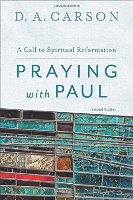Below is an excerpt from D.A. Carson’s excellent book, Praying with Paul.
Reproduced here with permission of the publisher.
Sad to tell, we are sufficiently perverse that we can find reasons for not praying no matter what perspective we adopt.
Consider missions. If, on the one hand, you believe that God “elects” or chooses some people for eternal life, and does not choose others, you might be tempted to conclude that there is no point praying for the lost. The elect will infallibly be saved, so why bother praying for them? So you have a good reason not to pray.
If, on the other hand, you think that God has done all he can to save the lost, and now it all depends on their free will, why ask God to save them? He has already done his bit; there’s very little else for him to do. Just get out there and preach the gospel. Either way you have another reason not to pray.
You can really hurt your head thinking about this sort of thing.
The Bible insists that we pray, urges us to pray, gives us examples of prayer. Something has gone wrong in our reasoning if our reasoning leads us away from prayer; something is amiss in our theology if our theology becomes a disincentive to pray. Yet sometimes that is what happens. The slightly ingenuous but enthusiastic believer may have more experience at prayer than the theologian who thinks a lot about prayer.
Or again, sometimes when a Christian develops an increasing appreciation of “the doctrines of grace” — truths that underline God’s sovereignty, freedom, and grace — one of the first results is a tragic decrease in the discipline of prayer. That was part of my own pilgrimage at one point. The fault was not in the doctrines themselves but in me and in my inability to mesh them properly with other biblical teachings.
©2014 by D. A. Carson. Published by Baker Academic. Unauthorized use of this material without express written permission is strictly prohibited.
